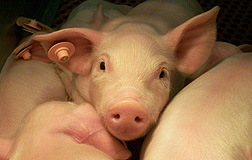 ARS scientists are studying a natural antimicrobial enzyme as a possible alternative to antibiotics for promoting pig health and growth.
ARS scientists are studying a natural antimicrobial enzyme as a possible alternative to antibiotics for promoting pig health and growth.Antibiotic Alternative Scores Well in Second Round of Swine Trials
By Jan Suszkiw
May 29, 2019
Writer's Note: This story has been re-published to include final revisions that had not been made to the 5/29 version, which had been posted in error.
Travelling can be a stressful experience—whether it be to a vacation spot or business destination. The stress of travel also extends to piglets, such as when they’re weaned from their mothers and transported to nursery barns.
Now, instead of using dietary antibiotics to help the piglets cope and avoid illness, scientists with the Agricultural Research Service (ARS) are investigating a naturally occurring amino acid known as L-glutamine.
Initial laboratory studies in 2017 showed glutamine-fed piglets gained more weight than antibiotic-treated ones, among other health benefits. But the researchers, led by ARS animal scientist Jay Johnson, wanted to try and replicate those results on a larger scale that more closely mimicked commercial production scenarios.
The effort, which was supported in part by the National Pork Board, arose from a need to provide livestock producers with alternatives to using dietary antibiotics as a growth-promoting agent in swine. A federal rule in 2017 eliminated the practice amid concerns that microbial resistance to medically important antibiotics could jeopardize their effectiveness in fighting human infection, notes Johnson, with the ARS Livestock Behavior Research Unit in West Lafayette, Indiana.
In the larger-scale trials, groups of piglets were weaned and then transported for 12 hours. After transport, piglets were housed in a nursery barn. This was done to simulate the kinds of stress they’d experience commercially, which can diminish the young animals’ immune system function, appetite and weight gain—something antibiotics helped them recover from.
For the nursery phase of the study, one group of piglets was fed a diet containing the antibiotics chlortetracycline and tiamulin, another glutamine and a third group nothing but feed ingredients.
Among the study’s findings:
- Glutamine-fed piglets gained weight as well as the antibiotics group.
- Glutamine group members were also somewhat less aggressive in pens with mixed litters than those given the antibiotics.
- Compared to the antibiotics-free group, glutamine- and antibiotic-treated piglets showed lower blood plasma levels of tumor necrosis factor alpha, a biochemical marker of inflammation.
- The meat quality of market-ready pigs from the glutamine group was no different than that of the antibiotic or antibiotics-free groups.
A paper detailing the study was published in the May 29 issue of the Journal of Animal Science.
The Agricultural Research Service is the U.S. Department of Agriculture's chief scientific in-house research agency. Daily, ARS focuses on solutions to agricultural problems affecting America. Each dollar invested in agricultural research results in $20 of economic impact.
